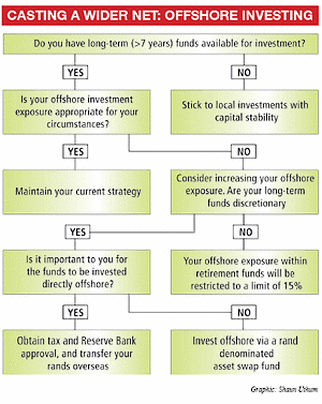Exploring Exactly How Spending Off Shore Works: A Comprehensive Overview
Spending offshore provides an intricate landscape of opportunities and difficulties. Comprehending the numerous sorts of overseas accounts is essential for anyone considering this route. The benefits, including enhanced privacy and property protection, are considerable. Lawful and tax implications necessitate cautious interest. As capitalists look for to enhance their portfolios, the actions to develop a feasible overseas financial investment method end up being necessary. What are the crucial elements that must navigate to be successful in this venture?
Recognizing Offshore Accounts and Their Kinds
What drives people and businesses to consider offshore accounts? The allure of monetary privacy, property security, and prospective tax obligation advantages often brings in the interest of those seeking to handle their riches extra strategically. Offshore accounts, typically developed in foreign jurisdictions, can be found in various forms. Personal accounts satisfy individual demands, providing solutions like savings, financial investment, or retirement preparation. Business accounts, on the various other hand, serve firms looking to help with worldwide transactions, enhance personal privacy, or maximize tax obligation responsibilities. Trust fund accounts offer an extra layer of defense, permitting individuals to safeguard their properties for future beneficiaries. Each sort of overseas account offers unique attributes, often affected by the governing environment of the host nation. Comprehending these distinctions is crucial for people and services, as the choice of account type can especially influence their economic approaches and conformity with global regulations.
Advantages of Offshore Spending
While several investors seek opportunities to diversify their profiles, offshore spending presents distinctive advantages that can boost economic development and security. One significant advantage is the possibility for possession security. Offshore accounts can guard financial investments from political instability or financial declines in the capitalist's home nation. Furthermore, offshore investments commonly give accessibility to worldwide markets, enabling investors to take advantage of emerging economic climates and industries that might not be readily available domestically.Another significant benefit is tax obligation efficiency. Several offshore territories supply positive tax obligation regimes, which can lessen tax obligation obligations and boost general returns. Offshore investing can improve personal privacy, as certain jurisdictions implement stringent discretion laws.Lastly, offshore accounts can facilitate riches monitoring methods by offering a bigger range of investment options, including different properties such as real estate and commodities. Collectively, these benefits make overseas spending an enticing option for those looking to enhance their monetary profiles.

Regulatory and lawful Considerations
Guiding via the regulatory and legal landscape of overseas investing needs mindful interest and understanding. Investing Off Shore. Financiers should navigate an intricate internet of laws that differ markedly from one jurisdiction to another. Conformity with local regulations is important; failure to do so can lead to severe charges, including fines and jail time. Additionally, knowing the legal structures controling international investments is essential for assuring the protection of properties and keeping functional legitimacy.Key considerations include understanding the regulative demands read this for developing offshore entities, such as trusts or companies, and adhering to anti-money laundering (AML) and know-your-customer (KYC) policies. Financiers need to additionally recognize reporting responsibilities in their home nation, as many nations call for disclosure of overseas holdings. Engaging with lawful specialists experienced in overseas financial investment can supply vital assistance, assisting capitalists to minimize dangers and safe and secure compliance with relevant regulations and guidelines while maximizing their investment capacity

Tax Obligation Ramifications of Offshore Investments
Understanding the regulatory and lawful factors to consider of offshore investing normally leads to an exam of the tax implications related to these financial investments. Offshore investments can offer considerable tax obligation advantages, including lowered tax rates and the capacity for tax deferment. Capitalists must browse complicated tax policies in their home countries, as numerous jurisdictions need taxpayers to report international earnings and assets.For U.S. residents, the Foreign Account Tax Compliance Act (FATCA) mandates the reporting of overseas accounts, while various other nations have comparable requirements. Failing to abide can cause serious charges. Furthermore, specific offshore funds may be subject to unique tax obligation therapies, such as Passive Foreign Investment Firm (PFIC) rules, making complex financial investment strategies.Investors need to consider getting in touch with tax obligation professionals to comprehend implications specific to their circumstances and assurance conformity with both international and residential tax laws, inevitably optimizing the benefits of their offshore financial investments while lessening dangers.
Actions to Start With Offshore Spending
Several capitalists looking for to expand their portfolios transform to offshore investing as a viable option. To begin, one need to conduct comprehensive research on possible overseas territories, taking into consideration elements such as regulatory setting, tax, and investment possibilities. Investing Off Shore. After picking an ideal location, financiers should establish an offshore account, which generally calls for documentation confirming identity and resource of funds.Next, financiers often engage with an offshore financial investment or an economic advisor firm accustomed to neighborhood laws and market dynamics. This collaboration can aid in crafting a customized investment strategy that aligns with specific objectives and run the risk of tolerance.Once the approach remains in area, financiers can proceed to select specific properties or funds for investment, ensuring they evaluate efficiency and runs the risk of routinely. Preserving compliance with both regional and home nation policies is essential for successful overseas investing, calling for ongoing diligence and possibly periodic examinations with lawful experts.

Regularly Asked Questions
Just how Do I Choose the Right Offshore Territory?
Choosing the right overseas jurisdiction involves examining aspects such as regulatory atmosphere, tax benefits, political stability, and convenience of operating. Looking into each choice extensively assures informed choices that straighten with specific financial investment objectives and run the risk of YOURURL.com resistance.
What Kinds Of Possessions Can I Hold Offshore?

Exist Dangers Connected With Offshore Spending?
The risks connected with offshore investing include lawful complexities, regulative adjustments, money changes, and potential political instability. Capitalists must meticulously examine these factors to reduce threats and warranty conformity with worldwide legislations and guidelines.
Just How Can I Accessibility My Offshore Finances?
To check my site gain access to offshore funds, individuals commonly need to contact their economic organization, provide needed identification and documentation, and adhere to established methods for fund transfers, ensuring conformity with both international and neighborhood guidelines regulating overseas financial investments.
What Prevail False Impressions Concerning Offshore Accounts?
Common misconceptions concerning offshore accounts consist of ideas that they are entirely for tax evasion, lack of guideline, or only available to the rich. Actually, they can be genuine monetary devices for diverse people. Additionally, offshore investments often give access to global markets, allowing financiers to tap right into emerging economies and markets that might not be readily available domestically.Another significant benefit is tax efficiency. Overseas investing can enhance privacy, as particular jurisdictions enforce rigorous confidentiality laws.Lastly, offshore accounts can help with wealth management approaches by supplying a wider variety of financial investment options, including alternate properties such as actual estate and products. Understanding the regulative and lawful factors to consider of overseas investing normally leads to an examination of the tax ramifications linked with these investments. Offshore investments can offer considerable tax advantages, including minimized tax rates and the capacity for tax deferral. After selecting a suitable location, investors ought to establish an offshore account, which generally needs paperwork confirming identification and resource of funds.Next, investors commonly involve with an offshore investment or an economic consultant company acquainted with neighborhood regulations and market dynamics.